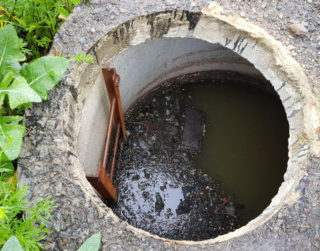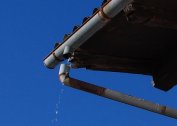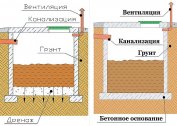Cesspools are equipped to remove human waste products in dachas or land plots with small private houses. The construction of such treatment facilities does not take much time and does not require large cash costs. As a rule, special services are called for cleaning cesspools, but it also happens that the location of the septic tank does not allow special equipment to drive up and pump out sewage, or this method is not beneficial to the owner of the house. Then you should use chemical and biological agents to clean the cesspool without pumping.
Biological preparations
 Many owners of private farmsteads have encountered a mechanical method of cleaning a cesspool or a country toilet, and they know firsthand how unpleasant it is. Most of them preferred pumping biological products, the advantages of which are obvious:
Many owners of private farmsteads have encountered a mechanical method of cleaning a cesspool or a country toilet, and they know firsthand how unpleasant it is. Most of them preferred pumping biological products, the advantages of which are obvious:
- Under the influence of bacteria, waste products turn into a harmless substance.
- Fecal masses decrease in volume.
- The smell disappears.
- The resulting mass is an excellent fertilizer for garden plants.
Features to use
The composition of such funds includes cultural (artificially grown in laboratory conditions) bacteria. Their features:
- Unlike microorganisms developing in nature, they cannot adapt to extreme conditions.
- Do not tolerate low temperatures and contact with household chemicals.
- To ensure normal functioning, a liquid medium is necessary.
- When the contents of the cesspool dry out, the culture bacteria die.
The regular use of biological agents makes it possible to dispense with pumping out the contents of the cesspool, which does not include household chemicals. The drugs are effective in the warm season.
The most effective biological products
 These include Bioexpert, Ecorecycle, Sanfor Bioactivator, Bioactivator, Living Bacteria Biocept. The listed biological products are safe for insects, animals and humans.
These include Bioexpert, Ecorecycle, Sanfor Bioactivator, Bioactivator, Living Bacteria Biocept. The listed biological products are safe for insects, animals and humans.
Bioexpert is available in the form of effervescent tablets. It consists of selective microorganisms, enzymes, minerals. Removes deposits of detergents, greasy deposits, eliminates unpleasant odors. Suitable for septic tanks and cesspools. In tanks with a volume of up to three cubic meters, 1 tablet per month is enough to achieve the desired effect. For cesspools, bacteria must be activated by dissolving the tablet in 5-7 liters of water.
Ecorecycle is a universal preparation for cleaning septic tanks and cesspools. Available in powder form. Reduces the volume of deposits, neutralizes the smell of sewage. Effective only in an organic environment. Not suitable for sewage pits where household chemicals get. One bag (75 g) is enough for a month with a pit volume of 2 cubic meters.
"Sanfor Bioactivator". It contains wheat bran (30%), cultured microorganisms (5%), sodium bicarbonate (65%). The drug eliminates unpleasant odors, fatty and fecal deposits, accumulations of phenols and cellulose. A package weighing 40 g is valid for a month and reduces the contents of the cesspool by 30%.
"Bioactivator Live Bacteria Biocept" is available in the form of granules and powder. It begins to act 2 hours after getting into the sewer (flushing water in toilets, sinks, shower or bath). It decomposes the fecal masses and the remnants of toilet paper, removes greasy deposits and soap deposits from detergents. Frequency of use - 1 dose (25 g sachet) in 2 weeks.
The instructions attached to any of them, which will indicate the type of a suitable cesspool, will help you choose the right drug.
Chemicals
 Used for cleaning septic tanks and street toilets for a long time. Most often, formaldehyde-based preparations were used. However, it is highly toxic, dangerous to human health, animals, harmful to the environment, therefore, from the end of the twentieth century is prohibited.
Used for cleaning septic tanks and street toilets for a long time. Most often, formaldehyde-based preparations were used. However, it is highly toxic, dangerous to human health, animals, harmful to the environment, therefore, from the end of the twentieth century is prohibited.
Among modern chemicals for cleaning and disinfecting cesspools, preparations based on:
- ammonium compounds;
- nitric (nitrate) oxidizing agents.
The first relate to budget funds for cleaning septic tanks. They are not as toxic as formaldehyde, but are still dangerous to human health and the environment. The second are recognized as the safest. In composition, these cleaning products are close to nitrogen fertilizers that are used in agriculture.
Application features
Cons of ammonium compounds:
- The substance obtained as a result of processing using chemical cleaners based on ammonium compounds cannot be used to fertilize crops.
- The effectiveness of such drugs is markedly reduced when interacting with household cleaning products.
Nitrogen oxidizers have only one minus - a high price. Pluses are much more:
- do not lose effectiveness when combined with household chemicals.
- well cope with the decomposition of biological inclusions;
- neutralize unpleasant odors.
Such cleaners are used to dissolve silty sediments and solid particles in cesspools and neutralize harmful bacteria.
The most effective chemicals
 Widespread use of funds based on nitrate oxidizing agents of the Devon line - “Devon-N” and “Devon-Il”. After using them, a safe liquid is obtained, which can be poured into a compost heap.
Widespread use of funds based on nitrate oxidizing agents of the Devon line - “Devon-N” and “Devon-Il”. After using them, a safe liquid is obtained, which can be poured into a compost heap.
"Devon-N" is a universal means of a wide spectrum of action. It is delivered in disposable bags weighing 30 g and in liquid form in containers with various volumes (0.25, 0.5, 1.0 and 2.0 l). Benefits:
- effectively eliminates unpleasant odors;
- does not lose properties at subzero temperatures;
- does not contain alkalis, acids, formaldehyde, quaternary ammonium compounds;
- liquefies fecal matter, while reducing the amount of contents of cesspools.
It is most convenient to use the drug in the form of a powder. To remove the smell of impurities, the contents of two sachets (60 g) are diluted in a liter of warm water and the surface of the cesspool is irrigated using a watering can. This amount is enough for a tank with a surface area of 2-3 m2. Valid from 2 to 4 weeks.
"Devon-Il" is a preparation for eliminating siltation and blockages in septic tanks, drain wells and cesspools. Available in the form of concentrated liquid in 1.5 liter containers. Benefits:
- eliminates odors of sewage;
- not afraid of low temperatures;
- environmentally friendly.
For the prevention of blockages and siltation in the absence of odors: 50-100 ml of the product in the toilet or sink once a month. If an unpleasant odor is present - the same amount is poured every week.
Detailed instructions are attached to the described preparations. It must be carefully studied before use.
When cleaning is needed
 To cope with the masses in the cesspool is not always possible with chemical and biological preparations:
To cope with the masses in the cesspool is not always possible with chemical and biological preparations:
- With improperly installed drain pipes (when they are too low), sludge deposits clog the drain, resulting in blockage.
- If liquid waste from the bathtub and kitchen, in which synthetic detergents are present, is drained into the pit. Most drugs do not work with them.
Signs of cesspool overflow:
- Bad smell next to her.
- Slowing down the discharge of water from the toilet, sinks, sinks.
- The appearance of flies nearby.
If the signs described above are observed, emergency cleaning is required - it is recommended to call the sewage system.
Prevention
When arranging cesspools and septic tanks, it is necessary to correctly calculate their total volume in accordance with the number of people living in the house and the intensity of the use of sewage. During operation, errors may “pop up” due to which you have to call special services to pump out the content.
In order to continue to avoid the problem with septic tank overflow, it is necessary to regularly prevent blockages after cleaning:
- Rinse the pit every two months with a strong pressure of water.
- Use biological products in the warmer months to reduce solid waste.
- If the country house is designed for year-round use, arrange the insulation of the tank. This will prevent freezing of the waste material.
It’s quite possible to clean the cesspool without resorting to the services of scavengers. Use biological or chemical special preparations for this. Before use, carefully read the instructions. Biological agents allow the use of processed fecal matter in the garden area as a full-fledged fertilizer.


